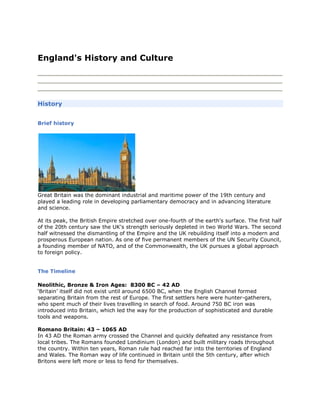
England
- 1. Top of Form<br />England's History and Culture <br />Skip to content <br />Skip to search <br />Skip to navigation <br />Skip to footer <br />Accessibility statement <br />back to top <br />You are here: <br />Home<br />About England<br />England's History<br />England's History and Culture<br />back to top <br />History<br />Brief history<br />Great Britain was the dominant industrial and maritime power of the 19th century and played a leading role in developing parliamentary democracy and in advancing literature and science. At its peak, the British Empire stretched over one-fourth of the earth's surface. The first half of the 20th century saw the UK's strength seriously depleted in two World Wars. The second half witnessed the dismantling of the Empire and the UK rebuilding itself into a modern and prosperous European nation. As one of five permanent members of the UN Security Council, a founding member of NATO, and of the Commonwealth, the UK pursues a global approach to foreign policy. <br />The Timeline<br />Neolithic, Bronze & Iron Ages: 8300 BC – 42 AD‘Britain’ itself did not exist until around 6500 BC, when the English Channel formed separating Britain from the rest of Europe. The first settlers here were hunter-gatherers, who spent much of their lives travelling in search of food. Around 750 BC iron was introduced into Britain, which led the way for the production of sophisticated and durable tools and weapons. Romano Britain: 43 – 1065 ADIn 43 AD the Roman army crossed the Channel and quickly defeated any resistance from local tribes. The Romans founded Londinium (London) and built military roads throughout the country. Within ten years, Roman rule had reached far into the territories of England and Wales. The Roman way of life continued in Britain until the 5th century, after which Britons were left more or less to fend for themselves. Anglo-Normans & Middle Ages: 1066 –1347In 1066 Duke William of Normandy invaded Britain and famously defeated King Harold of England, who legend has it was shot with an arrow through the eye during the Battle of Hastings. William of Normandy went on to rule England and Scotland, radically changing the class system and changing the official language to French. In 1216, Henry III was crowned king, but was unpopular throughout his rule. Late Medieval: 1348 – 1484The bubonic plague – or Black Death – reached England in 1348 and quickly spread to Wales and Scotland, killing up to a third of the population by the end of 1350. The plague persistently re-emerged until the 17th century, severely affecting the country's economic balance. In order to combat the devastating effects of the plague, the ruling classes attempted to restore economic stability through parliamentary legislation. Tudors Stuarts: 1485 – 1713 In 1485, Henry Tudor invaded England and defeated Richard III to assume sovereignty. He went on to marry Elizabeth of York – daughter of Edward IV. In 1603 Elizabeth I – the Virgin Queen – died. With Elizabeth leaving no successor, James VI, King of Scots (son of Mary, Queen of Scots), succeeded as James I, King of England, effectively making him the first King of Great Britain. Georgians: 1714 - 1836After the death of Queen Anne, George I became king, whose reign saw the development of the function of prime minister. Although the term ‘prime minister’ was not used at the time, Sir Robert Walpole assumed the role typical of a prime minister thanks to his successes in developing economic growth for the country. Victorians: 1837 - 1900 Victoria – the longest reigning British monarch – became Queen in 1837, aged just eighteen. During her reign, she introduced a number of constitutional changes and the spirit of these changes led to the publishing of the people's charter, which laid out six demands including universal manhood suffrage and annual parliamentary elections. The charter was continually rejected in parliament, but today five out of the six original demands are firm parts of the British constitution. Early 20th Century: 1901 - 1944 The early twentieth century saw advances in science and technology that were unimaginable in previous eras. Among the ground-breaking achievements of this period were: the invention of the television by the EMI-Marconi Corporation; and subsequent founding of the British Broadcasting Company (BBC); the discovery of penicillin by Alexander Fleming; and insights into the structure of the atom, which led to the development of nuclear weapons and energy. Post World War II: 1945 - 2006In 1945 the Labour Party won their first general election, going on to form the National Health Service, which many regard as Labour’s greatest achievement. Post-war rationing continued, but the era was marked by public enthusiasm and hope for the future. Since then, Britain has faced a number of economic crises, but survives today as one of the world’s leading trade and financial centres, with advanced public services and a thriving economy.<br />.<br />Related Links<br />British History (BBC) (www.bbc.co.uk/history/british/launch_tl_british.shtml)<br />back to top <br />SEARCH <br />Please enter search criteria <br />Navigation<br />Home <br />About us<br />Tourist Information Centres<br />Tourist information finder<br />Our blog<br />About England <br />England's History<br />Practical Information<br />Royal England<br />Destinations <br />Destinations<br />City Guides<br />What to see and do <br />City breaks<br />Attractions and Events<br />Food & drink<br />Rural escapes<br />Heritage & culture<br />Family fun<br />Relaxing breaks<br />Accommodation <br />Accommodation types<br />Accessible accommodation<br />Green accommodation<br />Quality assurance and ratings<br />Travel <br />Travel to England<br />Travel Around England<br />Buy tickets & days out <br />E-newsletter <br />Choose Country/Language <br />Login <br />Register <br />Login and Register <br />Email: * Password: * <br />Forgotten password? <br />Register (New User) <br />Close X <br />Footer Links <br />©2009 VisitBritain<br />| More <br />Bottom of Form<br />